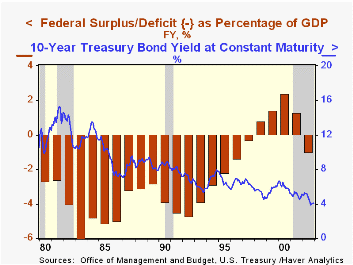 Global| Jan 22 2003
Global| Jan 22 2003Chain Store Sales Rose Slightly Again
by:Tom Moeller
|in:Economy in Brief
Summary
Chain store sales rose the same slight 0.3% as during the week prior according to the BTM-UBSW survey. Sales so far in January were up 2.1% from the December average. That likely represents a material gain in real terms due to the [...]

Chain store sales rose the same slight 0.3% as during the week prior according to the BTM-UBSW survey.
Sales so far in January were up 2.1% from the December average. That likely represents a material gain in real terms due to the usual post Christmas price discounting.
During the last ten years there has been a 49% correlation between the year-to-year percent change in monthly chain store sales and the change in GAF retail sales. That correlation rose to 64% during the last five years.
| BTM-UBSW (SA, 1977=100) | 1/18/03 | 1/11/03 | Y/Y | 2002 | 2001 | 2000 |
|---|---|---|---|---|---|---|
| Total Weekly Retail Chain Store Sales | 410.2 | 409.1 | 2.6% | 3.6% | 2.1% | 3.4% |
by Tom Moeller January 22, 2003

The index of mortgage applications, compiled by the Mortgage Bankers Association, fell 4.7% (52.1% y/y) last week following a 2.4% decline the week prior.
Mortgage applications to refinance fell 6.1% (96.3% y/y) following a 1.4% decline the week prior.
Mortgage applications for home purchase were down 0.8% (-4.4% y/y) following a 4.8% decline the prior week. The roughly 5% decline in mortgage applications for home purchase since last summer suggests the housing cycle has passed its peak. Nevertheless, activity levels remain high due to low interest rates.
Interest rates on conventional 30 Year mortgages fell to 5.74% from 5.84% the prior week. Rates on a 15 Year mortgage averaged 5.17%.
For analysis by the Federal Reserve of mortgage refinancing trends, click here.
| MBA Mortgage Applications (3/16/90=100) | 1/17/03 | 1/10/03 | 2002 | 2001 | 2000 |
|---|---|---|---|---|---|
| Total Market Index | 1,100.3.3 | 1,154.3 | 799.7 | 625.6 | 322.7 |
| Purchase | 355.3 | 358.0 | 354.7 | 304.9 | 302.7 |
| Refinancing | 5,433.4 | 5,786.4 | 3,388.0 | 2,491.0 | 438.8 |
by Tom Moeller January 22, 2003

The US budget last month came in near Consensus expectations for a $5.0 bil. surplus. That surplus was a fraction of last December's surplus. For the first quarter of FY03 the deficit totaled $108.7 bil., about triple the deficit in the first quarter of FY02.
Receipts for the first quarter fell 8.3% versus last year. Individual tax payments fell 12.7%. Corporate income taxes were down 40.8%. Social insurance contributions were up 6.1%.
Federal expenditures rose 6.9% versus last fiscal year's first quarter. Defense spending was up 16.5%. Spending on health (10.2%) and education (13.2%) programs continued strong. Spending on income security was up 14.2% with the weak economy. Interest expense was down 6.5% y/y.
For a discussion of budget deficits and interest rates by the Federal Reserve Bank of St. Louis, click here .
| US Government Finance | Dec | Nov | Y/Y | FY2002 | FY2001 | FY2000 |
|---|---|---|---|---|---|---|
| Budget Balance | $4.4B | $-59.1B | $26.6B | $-158.5B | $127.1B | $125.5B |
| Revenues | $182.8B | $120.0B | -2.7% | -6.9% | -1.7% | 10.8% |
| Outlays | $178.4B | $179.1B | 10.6% | 7.9% | 4.2% | 5.1% |
Tom Moeller
AuthorMore in Author Profile »Prior to joining Haver Analytics in 2000, Mr. Moeller worked as the Economist at Chancellor Capital Management from 1985 to 1999. There, he developed comprehensive economic forecasts and interpreted economic data for equity and fixed income portfolio managers. Also at Chancellor, Mr. Moeller worked as an equity analyst and was responsible for researching and rating companies in the economically sensitive automobile and housing industries for investment in Chancellor’s equity portfolio. Prior to joining Chancellor, Mr. Moeller was an Economist at Citibank from 1979 to 1984. He also analyzed pricing behavior in the metals industry for the Council on Wage and Price Stability in Washington, D.C. In 1999, Mr. Moeller received the award for most accurate forecast from the Forecasters' Club of New York. From 1990 to 1992 he was President of the New York Association for Business Economists. Mr. Moeller earned an M.B.A. in Finance from Fordham University, where he graduated in 1987. He holds a Bachelor of Arts in Economics from George Washington University.
More Economy in Brief
 Global| Feb 05 2026
Global| Feb 05 2026Charts of the Week: Balanced Policy, Resilient Data and AI Narratives
by:Andrew Cates






